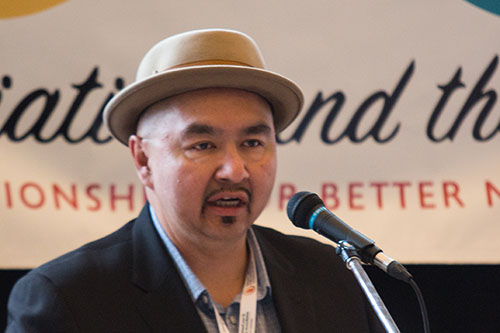“It’s all about applying the same level of critical thinking that you do about everything else, to Indigenous issues,” according to Connie Walker.
Connie Walker is a CBC investigative reporter, from the Okanese First Nation in Saskatchewan. She has devoted her career to covering Indigenous issues, and at the Reconciliation and the Media conference, she gave her take on reconciliation and talked about what sparked her passion for covering Indigenous issues in the first place.
“I think it’s about helping people understand the context of the stories that make the headlines,” Walker said. “Often, when it comes to Indigenous stories, it’s the crisis stories that dominate the headlines. I think that reconciliation is helping people understand the true history of the relationship between Indigenous people and the rest of Canada, and how that informs the issues that we are covering today.”
Walker has her own ideas about the lack of understanding of Indigenous issues. “So much of it can be traced back to not learning about residential schools in education and not learning about the impacts of colonization, assimilation, and policies geared towards 'cultural genocide.' Those issues are still impacting Canadians today,” she said.
Shannon Avison taught Walker in the Indian Communication Arts (INCA) program at Saskatchewan Indian Federated College (now First Nations University of Canada) in 1998. “Even then, she had contacts and context,” said Avison. “When she got to CBC, she was one of the people who has pushed and pushed for improvements in coverage of Indigenous stories…and she hasn’t given up.”
Walker speaks with passion as she dives into the issues that have defined her career, including the case that drove her to become so involved in Indigenous issues in the media.
“I was in high school when the Pamela George murder trial was going on, and that was the first time I felt like there was an injustice not to have an Indigenous voice or perspective in the mainstream media,” she recalled.
That lack of voice meant that there was nobody in most Canadian newsrooms who had a sense of the issues that were important to Indigenous people. “Ten years ago I pitched a story about a girl I knew who had gone missing, and there was just no interest in telling that story. Not only was there no interest, but there was distain in some ways.”
Since then, of course, the issue of missing and murdered Indigenous women has become an issue that the media is covering, especially as the numbers of reported cases has grown. “A native women’s organization estimates that there were 500 in Canada, and 10 years later a national inquiry has been called to investigate over 1,200 cases across the country,” said Walker.
Walker is encouraged by the progress Canadian media has made in its coverage of Indigenous issues. “Every national news organization in the country is reporting on these stories now, and has done serious investigative reporting on this issue.
“So I absolutely think the way we are covering it has changed, but I still think we need to go deeper. We really need to try and deepen the root causes of this issue and how it’s connected to other issues.”
Walker is proud of a podcast series that was just released by CBC, which takes an in-depth look at just one of Canada’s murdered women. “Missing and Murdered: Who Killed Alberta Williams?” explores the decades-old cold case of an Indigenous woman who was found murdered outside Prince Rupert, British Columbia on September 25, 1989.
“Missing and Murdered: Who Killed Alberta Williams?” is available for streaming at cbc.ca.
















